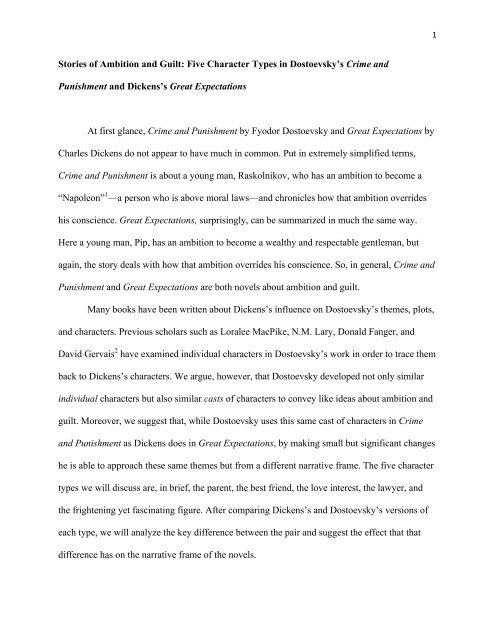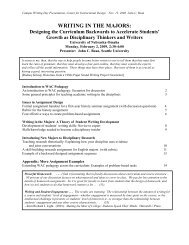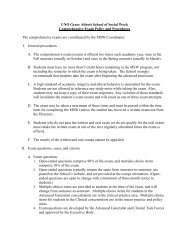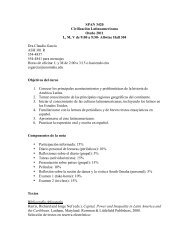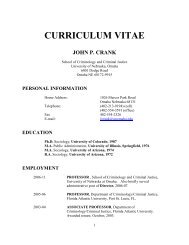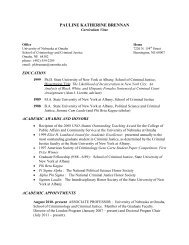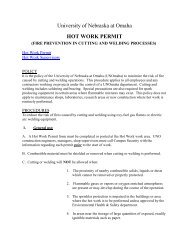Stories of Ambition and Guilt: Five Character Types in Dostoevsky's ...
Stories of Ambition and Guilt: Five Character Types in Dostoevsky's ...
Stories of Ambition and Guilt: Five Character Types in Dostoevsky's ...
You also want an ePaper? Increase the reach of your titles
YUMPU automatically turns print PDFs into web optimized ePapers that Google loves.
1 <br />
<strong>Stories</strong> <strong>of</strong> <strong>Ambition</strong> <strong>and</strong> <strong>Guilt</strong>: <strong>Five</strong> <strong>Character</strong> <strong>Types</strong> <strong>in</strong> Dostoevsky’s Crime <strong>and</strong><br />
Punishment <strong>and</strong> Dickens’s Great Expectations<br />
At first glance, Crime <strong>and</strong> Punishment by Fyodor Dostoevsky <strong>and</strong> Great Expectations by<br />
Charles Dickens do not appear to have much <strong>in</strong> common. Put <strong>in</strong> extremely simplified terms,<br />
Crime <strong>and</strong> Punishment is about a young man, Raskolnikov, who has an ambition to become a<br />
“Napoleon” 1 —a person who is above moral laws—<strong>and</strong> chronicles how that ambition overrides<br />
his conscience. Great Expectations, surpris<strong>in</strong>gly, can be summarized <strong>in</strong> much the same way.<br />
Here a young man, Pip, has an ambition to become a wealthy <strong>and</strong> respectable gentleman, but<br />
aga<strong>in</strong>, the story deals with how that ambition overrides his conscience. So, <strong>in</strong> general, Crime <strong>and</strong><br />
Punishment <strong>and</strong> Great Expectations are both novels about ambition <strong>and</strong> guilt.<br />
Many books have been written about Dickens’s <strong>in</strong>fluence on Dostoevsky’s themes, plots,<br />
<strong>and</strong> characters. Previous scholars such as Loralee MacPike, N.M. Lary, Donald Fanger, <strong>and</strong><br />
David Gervais 2 have exam<strong>in</strong>ed <strong>in</strong>dividual characters <strong>in</strong> Dostoevsky’s work <strong>in</strong> order to trace them<br />
back to Dickens’s characters. We argue, however, that Dostoevsky developed not only similar<br />
<strong>in</strong>dividual characters but also similar casts <strong>of</strong> characters to convey like ideas about ambition <strong>and</strong><br />
guilt. Moreover, we suggest that, while Dostoevsky uses this same cast <strong>of</strong> characters <strong>in</strong> Crime<br />
<strong>and</strong> Punishment as Dickens does <strong>in</strong> Great Expectations, by mak<strong>in</strong>g small but significant changes<br />
he is able to approach these same themes but from a different narrative frame. The five character<br />
types we will discuss are, <strong>in</strong> brief, the parent, the best friend, the love <strong>in</strong>terest, the lawyer, <strong>and</strong><br />
the frighten<strong>in</strong>g yet fasc<strong>in</strong>at<strong>in</strong>g figure. After compar<strong>in</strong>g Dickens’s <strong>and</strong> Dostoevsky’s versions <strong>of</strong><br />
each type, we will analyze the key difference between the pair <strong>and</strong> suggest the effect that that<br />
difference has on the narrative frame <strong>of</strong> the novels.
2 <br />
The Parent<br />
The first <strong>of</strong> the five types to consider is the dot<strong>in</strong>g parent. In Crime <strong>and</strong> Punishment,<br />
Raskolnikov’s parent figure is his mother, Pulkheria Alex<strong>and</strong>rovna, while <strong>in</strong> Great Expectations<br />
Pip, an orphan, has his stepfather, Joe Gargery. Both <strong>of</strong> these characters show love <strong>and</strong> devotion<br />
to the protagonists to the po<strong>in</strong>t that they <strong>of</strong>ten appear silly or overly sentimental, <strong>and</strong> are<br />
portrayed as be<strong>in</strong>g simple-m<strong>in</strong>ded <strong>and</strong> unable to underst<strong>and</strong> the goals <strong>and</strong> desires that motivate<br />
their children. It is <strong>in</strong>terest<strong>in</strong>g to notice that, despite these similarities, Pulkheria Alex<strong>and</strong>rovna<br />
<strong>and</strong> Joe meet very different ends <strong>in</strong> the novels, one dy<strong>in</strong>g <strong>of</strong> grief <strong>and</strong> the other marry<strong>in</strong>g a<br />
second time <strong>and</strong> liv<strong>in</strong>g happily ever after. These contrast<strong>in</strong>g end<strong>in</strong>gs most likely result from a<br />
subtle difference <strong>in</strong> the way the two parents deal with their <strong>in</strong>st<strong>in</strong>ctive sense <strong>of</strong> forebod<strong>in</strong>g when<br />
they realize that their son’s choices are separat<strong>in</strong>g him from the family.<br />
Pulkheria Alex<strong>and</strong>rovna beg<strong>in</strong>s to develop this sense the first time she physically enters<br />
the novel <strong>and</strong> visits Raskolnikov, who has just committed murder. She doesn’t know about the<br />
crime <strong>and</strong> is overjoyed at the prospect <strong>of</strong> see<strong>in</strong>g her son, but almost as soon as he walks <strong>in</strong>to the<br />
room (<strong>and</strong> fa<strong>in</strong>ts), she becomes uneasy <strong>and</strong> “preoccupied with anxiety.” 3 On the surface, this is<br />
merely because <strong>of</strong> his strange illness—but the illness really only gives Pulkheria Alex<strong>and</strong>rovna<br />
an excuse, someth<strong>in</strong>g to attribute Raskolnikov’s strange behavior to <strong>in</strong> the first moments she sees<br />
him. Raskolnikov tells her to leave <strong>and</strong> moans, “I can’t st<strong>and</strong> this…don’t torture me!” 4<br />
But<br />
Pulkheria Alex<strong>and</strong>rovna mistakes her sense that his words mean someth<strong>in</strong>g bigger is wrong for<br />
just concern over his delirious rav<strong>in</strong>g. This is the pattern that she will follow throughout the<br />
story: terrified at the conclusion her <strong>in</strong>st<strong>in</strong>cts would force her to draw about Raskolnikov’s<br />
character, she tries to conv<strong>in</strong>ce herself that she is only worried about trifles <strong>and</strong> that she suspects<br />
noth<strong>in</strong>g deeper or more serious. She lies to herself <strong>and</strong> acts accord<strong>in</strong>gly, pretend<strong>in</strong>g to everyone,
3 <br />
<strong>in</strong>clud<strong>in</strong>g Raskolnikov, that noth<strong>in</strong>g has changed between them. This practice, <strong>and</strong> the tension<br />
between her lack <strong>of</strong> honesty on the surface <strong>and</strong> her deep-down knowledge that Raskolnikov has<br />
committed a crime, eventually cause her to lose her m<strong>in</strong>d.<br />
Similarly, Joe first notices that someth<strong>in</strong>g is wrong with Pip when he goes to visit him<br />
after Pip has become a gentleman. Pip treats Joe coldly, embarrassed to have to enterta<strong>in</strong> a<br />
person <strong>of</strong> so little culture, <strong>and</strong> <strong>in</strong> reaction Joe unconsciously beg<strong>in</strong>s to call Pip “sir.” 5 Joe, a poor<br />
blacksmith, no longer has a place <strong>in</strong> Pip’s extravagant, appearance-oriented world, <strong>and</strong> is<br />
disturbed by Pip’s transformation from a k<strong>in</strong>d, <strong>in</strong>nocent boy to a snobbish stranger. But <strong>in</strong>stead<br />
<strong>of</strong> pretend<strong>in</strong>g that he is worried over noth<strong>in</strong>g or that what he perceives doesn’t mean the end <strong>of</strong><br />
his <strong>and</strong> Pip’s old relationship, like Pulkheria Alex<strong>and</strong>rovna, Joe accepts the facts. He assures Pip<br />
when they end their visit that “you <strong>and</strong> me is not two figures to be together <strong>in</strong> London,” 6<br />
demonstrat<strong>in</strong>g that he underst<strong>and</strong>s he <strong>and</strong> Pip can no longer be the pals they used to be. He<br />
doesn’t try to ignore his fear that Pip’s decisions will lead him astray, but, rather, cont<strong>in</strong>ues to<br />
love him <strong>in</strong> spite <strong>of</strong> his fail<strong>in</strong>gs, say<strong>in</strong>g he will be wait<strong>in</strong>g at the forge if Pip should ever want to<br />
come home. Pulkheria Alex<strong>and</strong>rovna, on the other h<strong>and</strong>, tries to overlook Raskolnikov’s fail<strong>in</strong>gs<br />
rather than accept them, which causes her to focus on an imag<strong>in</strong>ary version <strong>of</strong> her son. Joe looks<br />
at reality <strong>and</strong> is able to move forward; <strong>in</strong> contrast, Pulkheria Alex<strong>and</strong>rovna looks at her alternate<br />
reality <strong>and</strong> becomes lost <strong>in</strong>side herself.<br />
The Best Friend<br />
Just as the parent figures <strong>in</strong> the two novels have much <strong>in</strong> common, so do the protagonists’<br />
best friends. Throughout their struggles, both Raskolnikov <strong>and</strong> Pip have a companion who keeps<br />
them on track, act<strong>in</strong>g almost as a “sidekick.” Raskolnikov’s friend, Razumikh<strong>in</strong>, defends<br />
Raskolnikov’s <strong>in</strong>nocence—not realiz<strong>in</strong>g he is actually guilty—<strong>and</strong> takes it upon himself to care
4 <br />
for Raskolnikov when Raskolnikov is sick. Pip’s friend, Herbert, undertakes very similar duties<br />
<strong>in</strong> Great Expectations. He st<strong>and</strong>s by Pip’s decisions, even though Pip’s need to establish himself<br />
as a gentleman pressures them both to spend more on luxuries than they can afford. He also takes<br />
care <strong>of</strong> Pip when Pip burns his own arm rescu<strong>in</strong>g someone from a fire. Razumikh<strong>in</strong>’s <strong>and</strong><br />
Herbert’s actions appear almost identical <strong>in</strong> many ways; the difference, which makes these<br />
similarities all the more strange, is <strong>in</strong> their personalities—specifically <strong>in</strong> Razumikh<strong>in</strong>’s hot<br />
temper <strong>and</strong> Herbert’s mildness.<br />
Razumikh<strong>in</strong> is described as “subject to violent fits <strong>of</strong> rage, [with] a reputation for great<br />
physical strength.” 7 He argues with Raskolnikov’s fevered reason<strong>in</strong>g <strong>and</strong>, when Raskolnikov<br />
tries to escape a confrontation, shouts questions <strong>and</strong> <strong>in</strong>sults after him. In fact, whenever<br />
Razumikh<strong>in</strong> gives Raskolnikov advice or tries to help him with his troubles <strong>in</strong> the novel, he is<br />
blunt, brief, <strong>and</strong> <strong>of</strong>ten loud.<br />
Contrast<strong>in</strong>gly, Herbert is diplomatic <strong>and</strong> tactful, never rais<strong>in</strong>g his voice or criticiz<strong>in</strong>g Pip<br />
harshly. He is “wonderfully hopeful” 8 but lack<strong>in</strong>g <strong>in</strong> “natural strength” 9 <strong>and</strong> unlikely to be “very<br />
successful or rich” 10 —nearly the opposite <strong>of</strong> Razumikh<strong>in</strong>, who knows “a thous<strong>and</strong> <strong>and</strong> one ways<br />
<strong>of</strong> mak<strong>in</strong>g money” 11 even if he is currently poor. When Pip needs correction, Herbert treats his<br />
advice like improvement <strong>of</strong> someth<strong>in</strong>g already good, while Razumikh<strong>in</strong> usually emphasizes<br />
Raskolnikov’s faults, at least at first, to get him to change.<br />
The question is, what do these opposite but equally successful methods <strong>of</strong> encouragement<br />
tell us about the k<strong>in</strong>d <strong>of</strong> support Raskolnikov <strong>and</strong> Pip need? Though they are <strong>in</strong> similar positions,<br />
torn by ambition <strong>and</strong> guilt, Raskolnikov values Razumikh<strong>in</strong>’s fierce, berat<strong>in</strong>g manner while Pip<br />
responds well to Herbert’s gentle coax<strong>in</strong>g. One explanation for the success <strong>of</strong> such different<br />
tactics h<strong>in</strong>ges on whether the protagonists, follow<strong>in</strong>g their flawed goals, are primarily runn<strong>in</strong>g
5 <br />
away from someth<strong>in</strong>g good or toward someth<strong>in</strong>g bad. Raskolnikov turns away from his lov<strong>in</strong>g<br />
family, gives up teach<strong>in</strong>g, <strong>and</strong> withdraws from society, but only because he is so focused on<br />
grasp<strong>in</strong>g his idea <strong>of</strong> a Napoleon who is above morality—he is pulled forward by someth<strong>in</strong>g<br />
essentially bad. Razumikh<strong>in</strong>, therefore, must be harsh <strong>and</strong> combative <strong>in</strong> order to st<strong>and</strong> between<br />
Raskolnikov <strong>and</strong> his goal <strong>and</strong> drive him <strong>of</strong>f. Pip, on the other h<strong>and</strong>, wants to acquire wealth <strong>and</strong><br />
education only because it distances him from his poor relations at the blacksmith forge—out <strong>of</strong><br />
shame he strives to escape someth<strong>in</strong>g that is, for the most part, good. Thus, Herbert must be<br />
warm <strong>and</strong> <strong>in</strong>vit<strong>in</strong>g <strong>in</strong> order to draw Pip back to the life he should never have rejected.<br />
The Love Interest<br />
One <strong>of</strong> the most important character types <strong>in</strong> both novels is the protagonist’s love<br />
<strong>in</strong>terest. It is commonly said that we become like what we love, <strong>and</strong>, fitt<strong>in</strong>gly, Sonya from Crime<br />
<strong>and</strong> Punishment <strong>and</strong> Estella from Great Expectations both <strong>in</strong>spire change <strong>in</strong> the protagonists.<br />
Raskolnikov <strong>and</strong> Pip both fall <strong>in</strong> love, to different degrees <strong>and</strong> at different po<strong>in</strong>ts <strong>in</strong> their stories,<br />
<strong>and</strong> both, consciously or subconsciously, try to change themselves to be like their beloved.<br />
Though this same dynamic is at work <strong>in</strong> both stories, Raskolnikov is a better person at the<br />
conclusion <strong>of</strong> his novel than he was at the beg<strong>in</strong>n<strong>in</strong>g, while Pip is worse, though on the mend.<br />
The reason the stories end so differently depends on the nature <strong>of</strong> the women they want to please,<br />
as well as on whether Raskolnikov <strong>and</strong> Pip were objectively or subjectively bad when they felt<br />
the need to change themselves.<br />
Raskolnikov encounters Sonya after he has been seized by his ambition to test if he is an<br />
extraord<strong>in</strong>ary man who can commit any crime without need<strong>in</strong>g to serve a punishment. He has<br />
already embarked on this mission by kill<strong>in</strong>g two people with an ax <strong>and</strong> dispos<strong>in</strong>g <strong>of</strong> the<br />
evidence. Therefore, when he meets Sonya he can be viewed as be<strong>in</strong>g objectively bad. Sonya is
6 <br />
gentle, self-sacrific<strong>in</strong>g, <strong>and</strong> k<strong>in</strong>d, forced to become a prostitute to support her poverty-stricken<br />
family. Generous <strong>and</strong> lov<strong>in</strong>g even <strong>in</strong> the face <strong>of</strong> hardships, she <strong>of</strong>ten seems almost sa<strong>in</strong>tly <strong>in</strong> her<br />
virtue. Raskolnikov, <strong>in</strong> chang<strong>in</strong>g to be like his beloved, is therefore chang<strong>in</strong>g from cold <strong>and</strong><br />
calculat<strong>in</strong>g to k<strong>in</strong>d <strong>and</strong> selfless, a def<strong>in</strong>ite improvement, <strong>and</strong> this pattern <strong>of</strong> change makes it<br />
possible for Crime <strong>and</strong> Punishment to be a story <strong>of</strong> redemption.<br />
In contrast, before Pip meets Estella, when he is very young, he is reasonably happy to<br />
live with a poor family <strong>in</strong> the marsh country, learn<strong>in</strong>g simple read<strong>in</strong>g <strong>and</strong> writ<strong>in</strong>g <strong>and</strong> wait<strong>in</strong>g for<br />
the day when he will be old enough to apprentice as a blacksmith to his stepfather. In other<br />
words, before Estella Pip can be considered objectively a good person. Estella herself is also no<br />
Sonya—she is haughty <strong>and</strong> rich, <strong>and</strong> laughs at Pip’s “coarse h<strong>and</strong>s” <strong>and</strong> “thick boots,” 12 taunt<strong>in</strong>g<br />
him cont<strong>in</strong>uously about be<strong>in</strong>g lower class. Stung by this <strong>and</strong> <strong>in</strong> awe <strong>of</strong> Estella’s beauty, Pip<br />
decides he must improve himself until he w<strong>in</strong>s her love <strong>and</strong> respect. The problem is that, <strong>in</strong> his<br />
hurt <strong>and</strong> humiliation at be<strong>in</strong>g teased by someone he so admires, Pip beg<strong>in</strong>s to th<strong>in</strong>k <strong>of</strong> his old life<br />
as bad <strong>and</strong> Estella’s life as good, although these judgments are only subjectively true. On top <strong>of</strong><br />
that, <strong>in</strong> his attempt to become more like the cold, rude Estella, Pip must ab<strong>and</strong>on simple virtue <strong>in</strong><br />
favor <strong>of</strong> snobbishness, a pattern which—though he realizes <strong>and</strong> beg<strong>in</strong>s to fix his error by the<br />
conclusion—makes Great Expectations primarily a story <strong>of</strong> corruption <strong>and</strong> loss.<br />
The Lawyer<br />
The most strik<strong>in</strong>g similarity between the lawyer figures <strong>in</strong> the novels, aside from their<br />
pr<strong>of</strong>essions, is their personalities <strong>and</strong> mannerisms. Porfiry Petrovich <strong>in</strong> Crime <strong>and</strong> Punishment<br />
<strong>and</strong> Mr. Jaggers <strong>in</strong> Great Expectations are, <strong>in</strong> the most basic sense, two characters whom readers<br />
might easily connect <strong>in</strong> their m<strong>in</strong>ds as be<strong>in</strong>g “the same k<strong>in</strong>d <strong>of</strong> person.” Movie versions <strong>of</strong> the<br />
novels even cast the same actor as both Porfiry <strong>and</strong> Jaggers. 13 Both men are <strong>in</strong> positions to
7 <br />
exercise a significant amount <strong>of</strong> control over the protagonists: Porfiry Petrovich decides whether<br />
Raskolnikov will escape without punishment or go to prison <strong>in</strong> Siberia <strong>and</strong> Mr. Jaggers serves as<br />
Pip’s guardian <strong>in</strong> London <strong>and</strong> keeps track <strong>of</strong> Pip’s money, giv<strong>in</strong>g him portions <strong>of</strong> it at a time as if<br />
he were h<strong>and</strong><strong>in</strong>g out an allowance. Porfiry’s role, however, is crucial to the outcome <strong>of</strong> Crime<br />
<strong>and</strong> Punishment, while Jaggers’s duties are, for the most part, unnecessary—there is no plotbased<br />
reason that Pip must have a guardian or receive his fortune <strong>in</strong> chunks at all.<br />
To expla<strong>in</strong> this difference, we must first note that both books can be considered mystery<br />
stories, just mysteries with different stakes <strong>and</strong> told from different angles. In Crime <strong>and</strong><br />
Punishment, the mystery surrounds a murder, the twist be<strong>in</strong>g that we know the murderer from<br />
the beg<strong>in</strong>n<strong>in</strong>g. We also suspect that Porfiry knows the murderer. The central question, then, is<br />
“Will Raskolnikov get caught?” <strong>and</strong> s<strong>in</strong>ce the answer to this depends largely on Porfiry, who<br />
doesn’t reveal his <strong>in</strong>tentions either to let Raskolnikov go free or to arrest him until near the end<br />
<strong>of</strong> the story, there is great suspense surround<strong>in</strong>g his character. Similarly, Great Expectations is a<br />
mystery concern<strong>in</strong>g who Pip’s anonymous benefactor is, but this time we, like Pip, have no<br />
def<strong>in</strong>ite idea <strong>of</strong> who the person could be. We know that Jaggers knows the benefactor’s identity,<br />
but the question is not “Will Jaggers reveal the benefactor?” because he is work<strong>in</strong>g for the<br />
benefactor <strong>and</strong> has been <strong>in</strong>structed not to do so. The question then becomes simply “Who is the<br />
benefactor?” but because Mr. Jaggers will not provide any more <strong>in</strong>formation on that subject, he<br />
generates little or no suspense.<br />
What specifically separates the two novels is that the question “Will Raskolnikov get<br />
caught?” is closely l<strong>in</strong>ked to Raskolnikov’s driv<strong>in</strong>g ambition to test his theory—the ma<strong>in</strong> plot <strong>of</strong><br />
the book—while “Who is the benefactor?” is only a m<strong>in</strong>or po<strong>in</strong>t <strong>in</strong> Pip’s story. Pip’s driv<strong>in</strong>g<br />
ambition to become a gentleman is much more closely l<strong>in</strong>ked to a question like “Will Estella
8 <br />
ever return Pip’s love?” <strong>and</strong> this depends on Estella, who keeps us guess<strong>in</strong>g <strong>and</strong> becomes<br />
therefore a more important, suspenseful character than Jaggers. The fact that Porfiry Petrovich<br />
<strong>and</strong> Mr. Jaggers play such similar roles <strong>and</strong> yet rank at different levels <strong>of</strong> importance <strong>in</strong> their<br />
novels shows that, by <strong>in</strong>creas<strong>in</strong>g the lawyer figure’s prom<strong>in</strong>ence, Dostoevsky was able to shift<br />
the focus <strong>of</strong> his ambition <strong>and</strong> guilt story.<br />
The Frighten<strong>in</strong>g Yet Fasc<strong>in</strong>at<strong>in</strong>g Figure<br />
Perhaps the most perplex<strong>in</strong>g <strong>of</strong> the types that appear <strong>in</strong> both novels is that <strong>of</strong> the<br />
frighten<strong>in</strong>g yet fasc<strong>in</strong>at<strong>in</strong>g figure, a term which both sums up <strong>and</strong> fails to adequately describe the<br />
eerie <strong>and</strong> repulsive quality these characters display. Svidrigaylov, from Crime <strong>and</strong> Punishment,<br />
has “cold, watchful” blue eyes, “very red” lips, <strong>and</strong> a “spade-shaped beard,” 14 to match his cruel,<br />
greedy personality. Miss Havisham, Great Expectations’ creepy character, looks like a cross<br />
between a “ghastly wax-work” <strong>and</strong> “a skeleton <strong>in</strong> the ashes <strong>of</strong> a rich dress” with “dark eyes that<br />
moved <strong>and</strong> looked.” 15 Even more surpris<strong>in</strong>g than the appearance or nature <strong>of</strong> these characters<br />
themselves is how the protagonists feel about them. Both Raskolnikov <strong>and</strong> Pip move from their<br />
<strong>in</strong>itial aversion to an addictive fasc<strong>in</strong>ation with Svidrigaylov <strong>and</strong> Miss Havisham, before f<strong>in</strong>ally<br />
regard<strong>in</strong>g them with disgust.<br />
These attitudes with which the protagonists view the creepy character type <strong>and</strong> the<br />
attitudes with which they view their ma<strong>in</strong> goal with<strong>in</strong> the story are also strangely parallel. Both<br />
Raskolnikov’s <strong>and</strong> Pip’s goals, <strong>of</strong> course, are flawed—almost good, but twisted, like<br />
Svidrigaylov <strong>and</strong> Miss Havisham. Raskolnikov <strong>and</strong> Pip believe, nevertheless, that these goals<br />
hold the key to their happ<strong>in</strong>ess, just as, on some level, they believe that the creepy characters can<br />
help them.
9 <br />
For example, <strong>in</strong> the earliest stages <strong>of</strong> form<strong>in</strong>g his plan to kill the old woman, Raskolnikov<br />
is horrified by his own idea. His first impression <strong>of</strong> Svidrigaylov is also one <strong>of</strong> horrified anger.<br />
By the time Raskolnikov visits the pawnbroker to rehearse the murder, however, the crime “both<br />
repel[s] <strong>and</strong> fasc<strong>in</strong>ate[s] him,” 16 exactly like Svidrigaylov will later do. As Raskolnikov deals<br />
with the consequences <strong>of</strong> his ambition—illness, mental turmoil, difficult relations with those he<br />
loves, <strong>and</strong> guilt—he becomes disillusioned with his goal, <strong>and</strong>, consequently, disillusioned with<br />
Svidrigaylov. Pip, likewise, is repulsed <strong>and</strong> afraid the first time he meets Miss Havisham, but<br />
develops an <strong>in</strong>def<strong>in</strong>able curiosity about her the more he visits her. Later, Miss Havisham<br />
becomes connected—<strong>in</strong> Pip’s m<strong>in</strong>d—with Pip’s ma<strong>in</strong> goal to better his social position, because<br />
he th<strong>in</strong>ks she is pay<strong>in</strong>g for his opportunity to rise <strong>in</strong> society. Only when he learns otherwise <strong>and</strong><br />
realizes what he has lost <strong>in</strong> achiev<strong>in</strong>g the position he longed for, does he start to see Miss<br />
Havisham as “dreadful” <strong>and</strong> “witch-like” aga<strong>in</strong>. 17 In the end <strong>of</strong> both Crime <strong>and</strong> Punishment <strong>and</strong><br />
Great Expectations, the protagonist realizes that his ambition has led him to disaster, <strong>and</strong><br />
resolves to change his ways. Fitt<strong>in</strong>gly, the creepy characters both die at the end <strong>of</strong> the novels as<br />
well, Svidrigaylov from suicide <strong>and</strong> Miss Havisham from the burns she receives when her dress<br />
catches on fire.<br />
Even between these two very similar characters, however, there is one key difference.<br />
While both Svidrigaylov <strong>and</strong> Miss Havisham symbolize the protagonist’s ma<strong>in</strong> ambition,<br />
Svidrigaylov acts as a warn<strong>in</strong>g, a rem<strong>in</strong>der for the reader <strong>of</strong> what Raskolnikov could become,<br />
while Miss Havisham actively participates <strong>in</strong> the plot, <strong>in</strong>stigat<strong>in</strong>g Pip’s early dissatisfaction with<br />
himself <strong>and</strong> thus mak<strong>in</strong>g herself the reason he becomes what he does. Svidrigaylov embodies the<br />
cold, almost <strong>in</strong>human reason that Raskolnikov tries to achieve by committ<strong>in</strong>g the murder. A man<br />
virtually without a conscience, he <strong>in</strong>terests Raskolnikov because he has already succeeded <strong>in</strong>
10 <br />
achiev<strong>in</strong>g the moral state that Raskolnikov seeks. Throughout Crime <strong>and</strong> Punishment<br />
Svidrigaylov’s primary purpose is to represent this moral state, to display the alarm<strong>in</strong>g<br />
consequences <strong>of</strong> Raskolnikov’s ambition played out. To put it simply, he is a cautionary figure.<br />
Miss Havisham, it may be argued, is also a cautionary figure—but to her adopted<br />
daughter Estella, not to Pip. After be<strong>in</strong>g ab<strong>and</strong>oned on her wedd<strong>in</strong>g day, Miss Havisham resolves<br />
to hate all men, <strong>and</strong> spends most <strong>of</strong> her life try<strong>in</strong>g to <strong>in</strong>still this same hatred <strong>in</strong> Estella. In her<br />
relationship with Pip, however, Miss Havisham is an active, corrupt<strong>in</strong>g force rather than the<br />
passive foil that Svidrigaylov is to Raskolnikov. Near the beg<strong>in</strong>n<strong>in</strong>g <strong>of</strong> the story, she s<strong>in</strong>gles Pip<br />
out, <strong>in</strong>vites him to her house, <strong>and</strong> purposefully leads him to believe that she wants to arrange a<br />
marriage between him <strong>and</strong> Estella, even though she later admits that she never had any such<br />
<strong>in</strong>tention. Unlike Svidrigaylov, a man who lurks <strong>in</strong> the background to demonstrate the results <strong>of</strong><br />
ambition like Raskolnikov’s, Miss Havisham manipulates Pip <strong>in</strong> order to produce the results she<br />
desires <strong>in</strong> him.<br />
Conclusion<br />
With each <strong>of</strong> these five types that Crime <strong>and</strong> Punishment <strong>and</strong> Great Expectations have <strong>in</strong><br />
common, it is the subtle differences between the characters that allowed Dostoevsky to approach<br />
the themes from another perspective. Thus, while Dickens’s novel po<strong>in</strong>ts out the effects <strong>of</strong><br />
twisted ambition by show<strong>in</strong>g Pip’s downfall, Dostoevsky’s emphasizes the potential value <strong>of</strong><br />
guilt by show<strong>in</strong>g Raskolnikov’s confession <strong>and</strong> forgiveness. Both novels address the same<br />
themes with essentially the same cast <strong>of</strong> characters, but because <strong>of</strong> slight variations <strong>in</strong> the use <strong>of</strong><br />
those characters, Dickens <strong>and</strong> Dostoevsky frame their stories <strong>in</strong> quite different ways. The<br />
startl<strong>in</strong>g parallels between the casts <strong>of</strong> these two novels go beyond the five ma<strong>in</strong> character types<br />
that we have discussed here as well. Other possible pair<strong>in</strong>gs are Dunya <strong>and</strong> Biddy (the sister
11 <br />
figures), Marmeladov <strong>and</strong> Magwitch (old s<strong>in</strong>ners who attract the protagonist’s sympathy <strong>and</strong><br />
repulsion), Luzh<strong>in</strong> <strong>and</strong> Orlick (nasty suitors who target the sister figures <strong>and</strong> <strong>of</strong> whom the<br />
protagonists disapprove), <strong>and</strong> Alёna Ivanovna <strong>and</strong> Mrs. Joe (both victims <strong>of</strong> attacks to the head<br />
with heavy, blunt objects). We picked the five that seem to exert the most <strong>in</strong>fluence on the<br />
overall narrative frames <strong>of</strong> the novels, but a closer study <strong>of</strong> any <strong>of</strong> these types would surely yield<br />
further <strong>in</strong>sights <strong>in</strong>to Dostoevsky’s <strong>and</strong> Dickens’s techniques.
12 <br />
Notes<br />
1 Fyodor Dostoevsky, Crime <strong>and</strong> Punishment (Trans. Jessie Coulson. Ed. George Gibian. 3rd ed.<br />
New York: W. W. Norton & Company, Inc, 1989), 350.<br />
2 Donald Fanger, Dostoevsky <strong>and</strong> Romantic Realism: A Study <strong>of</strong> Dostoevsky <strong>in</strong> Relation to<br />
Balzac, Dickens, <strong>and</strong> Gogol; David Gervais, “Dostoevsky <strong>and</strong> the English Novel: Dickens, John<br />
Cowper Powys <strong>and</strong> D. H. Lawrence”; N.M. Lary, Dostoevsky <strong>and</strong> Dickens: A Study <strong>of</strong> Literary<br />
Influence; Loralee MacPike, Dostoevsky’s Dickens: A Study <strong>of</strong> Literary Influence.<br />
3 Dostoevsky, 168.<br />
4 Ibid., 166.<br />
5 Charles Dickens, Great Expectations (1868. New York: Barnes & Noble Classics, 2005), 212.<br />
6 Ibid., 215.<br />
7 Dostoevsky, 44.<br />
8 Dickens, 169.<br />
9 Ibid., 170.<br />
10 Ibid., 169.<br />
11 Dostoevsky, 44.<br />
12 Dickens, 58.<br />
13 Ian McDiarmid plays both Jaggers <strong>in</strong> Masterpiece Theater’s 1999 film, Great Expectations,<br />
<strong>and</strong> Porfiry <strong>in</strong> BBC’s 2002 m<strong>in</strong>iseries, Crime <strong>and</strong> Punishment.<br />
14 Dostoevsky, 207.<br />
15 Dickens, 56.<br />
16 Dostoevsky, 3.
13 <br />
17 Dickens, 293.<br />
Select Bibliography<br />
Dickens, Charles. Great Expectations. 1868. New York: Barnes & Noble Classics, 2005. Pr<strong>in</strong>t.<br />
Dostoevsky, Fyodor. Crime <strong>and</strong> Punishment. Trans. Jessie Coulson. Ed. George Gibian. 3 rd ed.<br />
New York: W.W. Norton & Company, Inc., 1989. Pr<strong>in</strong>t.<br />
Fanger, Donald. Dostoevsky <strong>and</strong> Romantic Realism: A Study <strong>of</strong> Dostoevsky <strong>in</strong> Relation to Balzac,<br />
Dickens, <strong>and</strong> Gogol. Cambridge, MA: Harvard University Press, 1965. Pr<strong>in</strong>t.<br />
Gervais, David. “Dostoevsky <strong>and</strong> the English Novel: Dickens, John Cowper Powys <strong>and</strong> D.H.<br />
Lawrence.” Cambridge Quarterly. 35.1 (2006): 49-71. Project Muse. Web. 6 April 2012.<br />
Klotz, Kenneth. Comedy <strong>and</strong> the Grotesque <strong>in</strong> Dickens <strong>and</strong> Dostoevsky. Diss. Yale University,<br />
1973. Ann Arbor: Xerox University Micr<strong>of</strong>ilms, 1973. Pr<strong>in</strong>t.<br />
Lary, N.M. Dostoevsky <strong>and</strong> Dickens: A Study <strong>of</strong> Literary Influence. London <strong>and</strong> Boston:<br />
Routledge & Kegan Paul Ltd., 1973. Pr<strong>in</strong>t.<br />
MacPike, Loralee. Dostoevsky’s Dickens: A Study <strong>of</strong> Literary Influence. Totowa: Barnes &<br />
Noble Books, 1981. Pr<strong>in</strong>t.<br />
Tambl<strong>in</strong>g, Jeremy. “Crim<strong>in</strong>als from a Sense <strong>of</strong> <strong>Guilt</strong>: Dickens <strong>and</strong> Dostoyevsky.” Cahiers<br />
Victoriens et Edouardiens. 55. (2002): 333-348. Pr<strong>in</strong>t.


